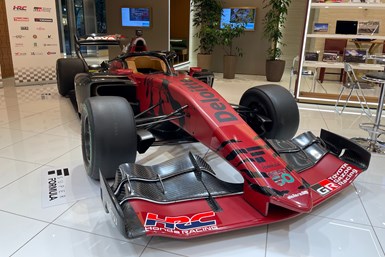Super Formula, Bcomp announce sustainable fiber composite bodywork
Japan’s premiere single-seater race series confirms hybrid composite parts for SF23 chassis as part of Next 50 plan.
First test for Super Formula and Bcomp SF23 race car. Photo Credit, all images: Super Formula, Bcomp
Swiss lightweighting specialists Bcomp Ltd. (Fribourg) and Super Formula, a Japanese open-wheeled racing championship, have confirmed a collaborative partnership for the new era of Japan’s premiere single-seater race series. Following successful testing of Bcomp’s flax fiber composites, Super Formula has confirmed the bodywork parts will appear on the new SF23 chassis.
The announcement was made on the championship’s 50th anniversary, with Super Formula looking ahead to its future and undertaking significant steps to target carbon neutrality, going as far as having specified measures for the use of new tire compounds with recycled rubber and natural compounding agents, in addition to the use of more sustainable
materials in the race cars’ construction.
Carbon fiber bodywork is used extensively throughout the motorsport industry and is responsible for a substantial carbon footprint. Many of the carbon fiber parts used in racing end up in landfills when damaged in a race, or when no longer needed. Bcomp’s ampliTex and powerRibs composite technologies, made from flax fiber, have shown to be a promising alternative, extensively proving their performance across the board in motorsports series from F1 to Formula E, Extreme E, DTM and GT4 on Porsche, Mercedes
Benz-AMG and BMW M GT cars (see below for examples).
Flax fibers achieve low density, high mechanical properties. The combination of ampliTex flax fabrics with patented powerRibs reinforcement grid enables the solution to match the low weight and high stiffness of carbon fiber bodywork parts in a more sustainable way — including a reduction of 90% in material CO2 emissions, and more than 80% reduction of CO2 emissions from cradle-to-gate, considering all production steps from raw material to the final part. The natural fiber composite also introduces safer crash behavior and eliminates the need to landfill damaged or old bodyworks.
Extensive testing has been conducted in 2022 by Super Formula drivers to evaluate the new engines, fuels, tires and, of course, the Bcomp bodywork. Sidepods and engine covers, entirely made from ampliTex and powerRibs, performed well in the initial tests Super Formula notes, but it seemed more appropriate to create hybrid parts for the implementation in the SF23. A
construction with about 70% flax and only 30% carbon fiber for local reinforcements proved to be an ideal combination of each material’s benefits, while still significantly reducing the carbon footprint. The collaboration has been nominated as a finalist for this year’s World Motorsport Symposium Green Tech Award.
“Super Formula is considered the second fastest racing series in the world and proves that sustainable technologies are ready to compete at the very highest performance level,” Johann Wacht, manager motorsports and supercars at Bcomp. “The series shows to the industry what is possible, and we are looking forward to a great season full of entertainment and sustainable innovations!”
The 2023 Super Formula will feature nine races across seven events, with double headers at the season opener at Fuji and the season finale at Suzuka next October.
Related Content
Evolving natural fiber technology to meet industry sustainability needs
From flax fiber composite boats to RV exterior panels to a circularity model with partnerships in various end markets, Greenboats strives toward its biomaterials and sustainable composites vision in an ever-changing market.
Read MorePUR composite sandwich panels for 3D automotive parts, high-volume panels and more
At its U.S. sites, Ascorium produces glass fiber/PUR 3D parts via semi-automated molding, high-volume flat panels via a continuous line while working toward bio-based PUR and recycling.
Read MoreSuper Resin Inc. highlights plant-based epoxy resin, foam core
Eco-friendly resin system using glycol lignin offers an eco-friendly option for CFRP structures and components, and core materials.
Read MoreDuplicor biocomposite cladding aids redevelopment of ABN AMRO office building in Amsterdam
Chosen for low CO2 footprint, RC value >9, fire resistance, light weight and high strength, Duplicor façade structures are key to two-story extension.
Read MoreRead Next
VIDEO: High-volume processing for fiberglass components
Cannon Ergos, a company specializing in high-ton presses and equipment for composites fabrication and plastics processing, displayed automotive and industrial components at CAMX 2024.
Read More“Structured air” TPS safeguards composite structures
Powered by an 85% air/15% pure polyimide aerogel, Blueshift’s novel material system protects structures during transient thermal events from -200°C to beyond 2400°C for rockets, battery boxes and more.
Read MoreDeveloping bonded composite repair for ships, offshore units
Bureau Veritas and industry partners issue guidelines and pave the way for certification via StrengthBond Offshore project.
Read More


























